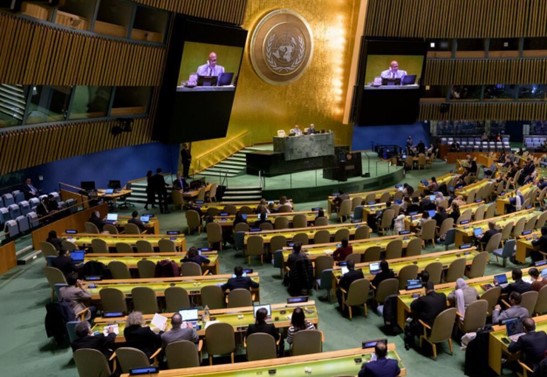International Day
On 16 December 2022, the United Nations General Assembly adopted a resolution to create an International Day of Police Cooperation, in recognition of the vital work of the law enforcement community around the globe. The day will be observed every 7 September, the date when INTERPOL’s predecessor, the International Criminal Police Commission (ICPC), was created in 1923.
UN General Assembly Resolutions
INTERPOL has been mentioned in more than 100 United Nations General Assembly resolutions covering a range of topics such as terrorism, human trafficking, weapons trafficking, corruption, environmental crime and cultural heritage crime.

Cooperation between our two organizations evolved in November 2016, when the UN General Assembly unanimously adopted Resolution 71/19; this recognized and called for greater coordination and cooperation between the two organizations, particularly concerning counter-terrorism, transnational crime, cybercrime, corruption and financial crime, and environmental crime. This resolution also calls on increased cooperation between United Nations and INTERPOL to maximize the use of INTERPOL’s readily available law enforcement resources, thereby benefiting the international community as a whole.
This resolution has been reviewed and unanimously adopted four additional times:
- As Resolution 73/11 in November 2018, introducing operational language on key areas of cooperation, particularly counter-terrorism;
- As Resolution 75/10 in November 2020, with increased emphasis on cybercrime, Global Policing Goals, and gender mainstreaming in law enforcement,;
- As Resolution 77/20 in November 2022, incorporating several areas of new language, including the INTERPOL Global Crime Programmes, new and emerging technologies, financial crime and corruption, cultural heritage crime, global health, and maritime security;
- As Resolution 79/136 in December 2024, expanding its focus on victim-centered areas, including human trafficking, crimes against children, corruption, and effective border management strategies, as well as mentioning INTERPOL Global Crime Trends Reports, innovative tools, and joint programmes and initiatives with the UN System.
UN Security Council Resolutions
INTERPOL’s role is enshrined in more than 50 Security Council resolutions. Landmark texts include:
- Resolution 2634 (2022) urges all States to share information with INTERPOL for use in the global maritime piracy database through regional information sharing arrangements, such as the ICC, and other appropriate channels.
- Resolution 2617 (2021) mentions the CTED-UNOCT-INTERPOL publication: The protection of critical infrastructures against terrorist attacks: Compendium of good practices.
- Resolution 2611 (2021) encourages the UN Monitoring Team to consult with INTERPOL to raise awareness of and learn about the practical implementation of the travel ban, including the use of advanced passenger information; to cooperate with INTERPOL and Member States to obtain photographs, physical descriptions and, in accordance with their national legislation, other biometric and biographic data of listed individuals when available for inclusion in Special Notices; and to assist other subsidiary bodies of the Council and expert panels, upon request, with enhancing their cooperation with INTERPOL.
- Resolution 2482 (2019) encourages Member States to make the best use of INTERPOL policing capabilities, including its array of investigative and analytical databases, in order to prevent and counter the linkages between terrorism and organized crime, whether domestic or transnational.
- Resolution 2462 (2019) encourages UN Member States to make best use of INTERPOL policing capabilities, such as relevant databases and analytical files, in order to prevent and counter the financing of terrorism.
- Resolution 2396 (2017) recognizes INTERPOL’s role to assist Member States in implementing the UN Global Counter-Terrorism Strategy, and to address the threat posed by foreign terrorist fighters.
- Resolution 2370 (2017) recognizes the vital role of INTERPOL in preventing the terrorist acquisition of weapons of mass destruction.
- Resolution 2322 (2016) recognizes INTERPOL’s role in combating all forms and aspects of trafficking in cultural property potentially benefitting terrorist groups.
- Resolution 2331 (2016) encourages INTERPOL to continue supporting States’ efforts to develop capabilities to address the issue of trafficking in persons where it is committed for the purpose of supporting terrorism.
- Resolution 2178 (2014) recognizes INTERPOL’s global role against the threat posed by foreign terrorist fighters.



